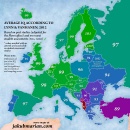 |
The meaning of ‘nothing but’ in English
The meaning of “nothing but” in English is closely related to the usage of “but” in all/anything/everything but, which is more idiomatic, (...)
July 5, 2014 – Jakub Marian – English
|
 |
Are we born with a certain IQ?
It is not exactly rocket science to understand that people get better at doing something with training (although it is almost brain (...)
July 2, 2014 – Jakub Marian – Blog
|
 |
Do languages influence our way of thinking?
Each language forces you to think in a slightly different way. There are many concepts that can be expressed easily in one language but (...)
June 30, 2014 – Jakub Marian – Language learning
|
 |
“United States is” / “United States are” – plural or singular?
The United States has always been causing (grammatical) trouble… or have been? “The United States” was treated as a plural noun in most (...)
June 28, 2014 – Jakub Marian – English
|
 |
Average IQ in Europe by country (map)
When we speak about IQ, it is important to understand that the common idea that IQ measures your “innate” or “genetic” intelligence is a (...)
|
By the way, have you already seen my brand new web app for non-native speakers of English? It's based on reading texts and learning by having all meanings, pronunciations, grammar forms etc. easily accessible. It looks like this:
 |
“All that” / “all what” / “all which” in English
English learners often use an incorrect pronoun after the word “all”. Long story short, what you most likely want to say is “all that (...)
June 25, 2014 – Jakub Marian – English
|
 |
‘But plants have feelings too’ argument against veganism
Every time I see a discussion about veganism (note that I am not a vegan myself), someone tries to argue that “scientists discovered that (...)
June 22, 2014 – Jakub Marian – Blog
|
 |
“Use to do” in English
One of the constructions English learners learn quite early is “someone used to do something”. It expresses that someone did something (...)
June 20, 2014 – Jakub Marian – English
|
 |
“On the Internet” / “in the Internet”, capital I
Prepositions are a common source of mistakes for learners of any language. The word “Internet” is especially problematic for an English (...)
June 18, 2014 – Jakub Marian – English
|
 |
‘Dot’, ‘period’, ‘full stop’, and ‘point’ in English
These four expressions, dot, period, full stop, and point, are often confused by learners. The distinction is actually rather simple. The (...)
June 17, 2014 – Jakub Marian – English
|
